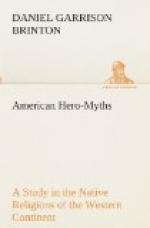It may be objected to this that it was not Christianity, but its accompaniments, the greedy horde of adventurers, the profligate traders, the selfish priests, and the unscrupulous officials, that wrought the degradation of the native race. Be it so. Then I merely modify my assertion, by saying that Christianity has shown itself incapable of controlling its inevitable adjuncts, and that it would have been better, morally and socially, for the American race never to have known Christianity at all, than to have received it on the only terms on which it has been possible to offer it.
With the more earnestness, therefore, in view of this acknowledged failure of Christian effort, do I turn to the native beliefs, and desire to vindicate for them a dignified position among the faiths which have helped to raise man above the level of the brute, and inspired him with hope and ambition for betterment.
For this purpose I shall offer some additional evidence of the extension of the myth I have set forth, and then proceed to discuss its influence on the minds of its believers.
The Tarascos were an interesting nation who lived in the province of Michoacan, due west of the valley of Mexico. They were a polished race, speaking a sonorous, vocalic language, so bold in war that their boast was that they had never been defeated, and yet their religious rites were almost bloodless, and their preference was for peace. The hardy Aztecs had been driven back at every attempt they made to conquer Michoacan, but its ruler submitted himself without a murmur to Cortes, recognizing in him an opponent of the common enemy, and a warrior of more than human powers.
Among these Tarascos we find the same legend of a hero-god who brought them out of barbarism, gave them laws, arranged their calendar, which, in principles, was the same as that of the Aztecs and Mayas, and decided on the form of their government. His name was Surites or Curicaberis, words which, from my limited resources in that tongue, I am not able to analyze. He dwelt in the town Cromuscuaro, which name means the Watch-tower or Look-out, and the hour in which he gave his instructions was always at sunrise, just as the orb of light appeared on the eastern horizon. One of the feasts which he appointed to be celebrated in his honor was called Zitacuarencuaro, which melodious word is said by the Spanish missionaries to mean “the resurrection from death.” When to this it is added that he distinctly predicted that a white race of men should arrive in the country, and that he himself should return,[1] his identity with the light-gods of similar American myths is too manifest to require argument.




